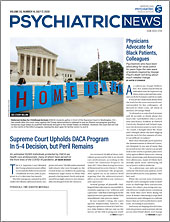The U.S. Supreme Court blocked the Trump administration’s effort to rescind the Deferred Action for Childhood Arrivals (DACA) program in a 5-4 decision last month.
The DACA program, initiated in 2012 under the Obama administration, has protected some 700,000 undocumented individuals who were brought to the United States as children by granting temporary legal status to those who passed a background check and graduated from high school or were honorably discharged from the military.
An estimated 30,000 of those individuals protected by DACA are health care professionals, according to the Center for American Progress. In June 2017, when then Acting Secretary of Homeland Security Elaine C. Duke sought to terminate the program, APA signed on to an amicus brief arguing that the administration’s effort to rescind DACA was “arbitrary and capricious.”
Several groups of plaintiffs challenged Duke’s decision to rescind DACA, similarly arguing it was “arbitrary and capricious” and that it infringed on the equal protection guarantee of the Fifth Amendment’s due process clause.
In last month’s ruling, the court agreed. Importantly, however, the majority opinion written by Chief Justice John Roberts did not rule on the merits of the DACA program itself. Rather, Roberts ruled that the Trump administration, in seeking to rescind the program, had failed to comply with procedural requirements of the Administrative Procedures Act by taking into account—among other factors—hardship that might be experienced by DACA beneficiaries. For this reason, the ruling makes it likely that the administration could continue efforts to rescind or scale back the program.
DACA recipients are sometimes referred to as “dreamers,” from the Development, Relief, and Education for Alien Minors Act—or DREAM Act—a never-approved legislative proposal that would have created a path to citizenship for immigrants illegally entering the country as minors. The DACA program did not create a path to permanent citizenship but granted only temporary protection.
“We do not decide whether DACA or its rescission are sound policies,” Roberts wrote. “The wisdom of those decisions is none of our concern. We address only whether the agency complied with the procedural requirement that it provide a reasoned explanation for its action. Here the agency failed to consider the conspicuous issues of whether to retain forbearance [protection for DACA recipients] and what if anything to do about the hardship to DACA recipients. That dual failure raises doubts about whether the agency appreciated the scope of its discretion or exercised that discretion in a reasonable manner. The appropriate recourse is therefore to remand to [the Department of Homeland Security] so that it may consider the problem anew.”
In the 2017 amicus brief, APA and the other groups stated that the “effects of rescinding DACA will extend far beyond the impact on DACA recipients themselves.”
The brief stated, “For years, health professional schools, hospitals, and even states themselves have invested substantially in educating and training DACA recipients under the expectation that they would be able to return that investment with a lifetime of practice that benefits the public in ways that will be crucial over the next decades.” APA CEO and Medical Director Saul Levin, M.D., M.P.A., emphasized that the COVID-19 pandemic has highlighted the importance of frontline health care workers, some of whom are DACA beneficiaries.
“Many of the doctors, nurses, and other health care workers doing heroic work during the pandemic were brought to this country by their parents and have been protected by the DACA program,” Levin said. “Rescinding the DACA program would have threatened our nation’s health care capacity, and we applaud the court for its decision.”
Adrienne Adams, M.D., chair of the diversity and inclusion committee of the American Association of Directors of Psychiatric Residency Training (AADPRT), agreed the ruling is a win, even though a temporary one. “We do need a longer-term solution,” she said. “But the ruling allows our residents and medical students who are dreamers to take a deep breath and know that for the time being they are still protected.”
Adams, who is director of the child and adolescent fellowship program at Rush Medical College, said it is not known how many, if any, psychiatric trainees are DACA recipients. She said the Committee on Diversity and Inclusion has undertaken a survey of AADPRT members and training programs.
“There is no doubt that during the pandemic, trainees of all specialties who are dreamers have been really instrumental,” she said. “If we did not have the dreamers it would have a severe impact on our health care system.” ■
The Supreme Court ruling is posted
here.
The June 2017 amicus brief is posted
here.


